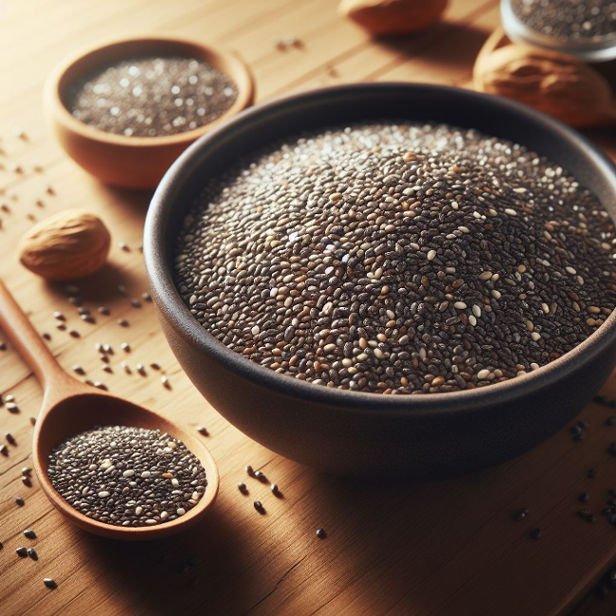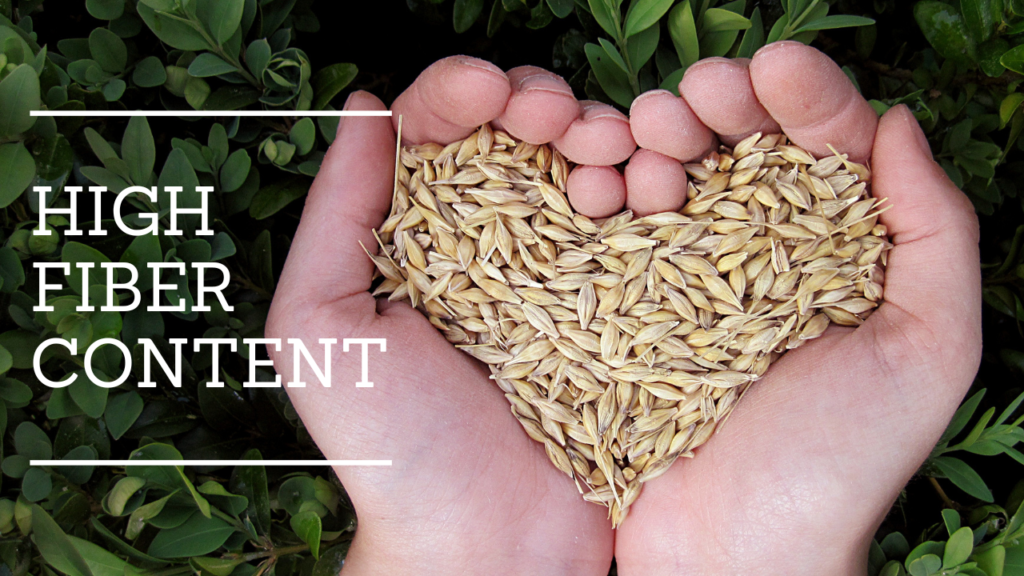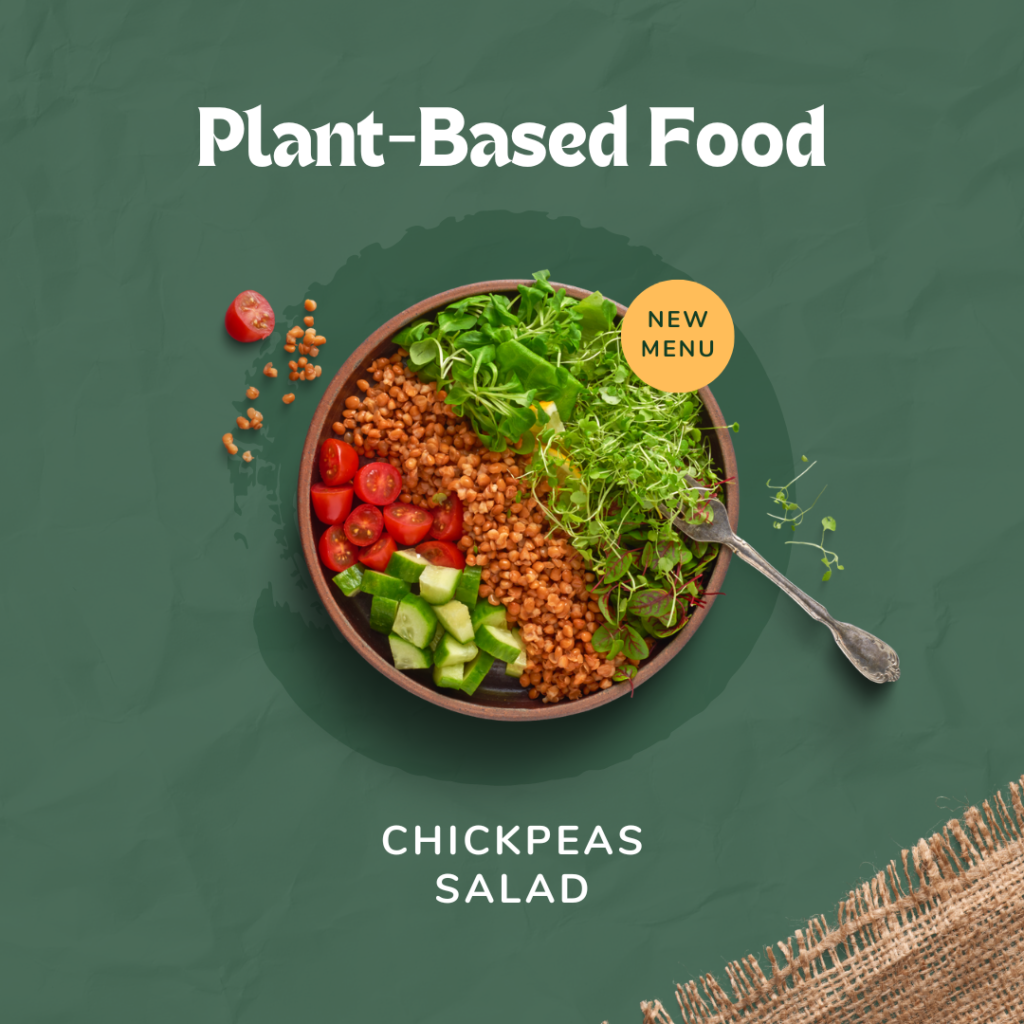
Chia seeds have emerged as a nutritional powerhouse, gaining popularity for their remarkable health benefits and versatility in modern diets. Packed with essential nutrients, including omega-3 fatty acids, fiber, and antioxidants, these tiny seeds offer a myriad of advantages for overall well-being. Beyond their nutrient-rich profile, chia seeds contribute to heart health, weight management, and bone support. Their plant-based protein content and blood sugar-regulating properties further enhance their appeal. In this exploration of chia seeds’ health benefits, we delve into the reasons behind their reputation as a valuable addition to a balanced and wholesome diet.
Nutrient-Rich Profile
Chia seeds boast an impressive nutrient-rich profile, making them a sought-after addition to a balanced diet. These tiny seeds are a concentrated source of essential nutrients, providing a significant nutritional punch in a small package. Rich in omega-3 fatty acids, chia seeds offer a plant-based alternative to fish sources, promoting heart health and reducing inflammation. Additionally, they are an excellent source of dietary fiber, aiding in digestion and promoting a feeling of fullness, which can be beneficial for weight management.
Furthermore, chia seeds contain antioxidants, such as quercetin and chlorogenic acid, which play a role in neutralizing free radicals and protecting cells from oxidative stress. This antioxidant content contributes to overall health and may have potential anti-aging effects.
Omega-3 Fatty Acids
Chia seeds are renowned for their significant content of omega-3 fatty acids, particularly alpha-linolenic acid (ALA). These essential fatty acids play a crucial role in supporting heart health and have been linked to various cardiovascular benefits. ALA, the primary omega-3 found in , is converted into eicosapentaenoic acid (EPA) and docosahexaenoic acid (DHA) in the body, similar to the omega-3s found in fatty fish.
Consuming omega-3 fatty acids has been associated with a reduced risk of heart disease by lowering blood pressure, reducing triglycerides, and preventing the formation of arterial plaque. Moreover, these fatty acids exhibit anti-inflammatory properties, contributing to overall inflammation control in the body.
High Fiber Content

Chia seeds are celebrated for their exceptional high fiber content, making them a valuable addition to a health-conscious diet. Despite their small size, these seeds pack a substantial amount of dietary fiber, with around 10 grams of fiber per ounce.
The high fiber content in contributes to various health benefits, particularly in promoting digestive health. Soluble fiber in chia seeds forms a gel-like substance when combined with liquid, aiding digestion and preventing constipation. This gel also helps slow down the absorption of sugar, contributing to better blood sugar regulation.
.comAdditionally, the fiber content promotes a feeling of fullness, which can be advantageous for those aiming to manage their weight. By increasing satiety, may assist in controlling overall calorie intake, supporting weight loss or maintenance efforts.
Furthermore, the soluble fiber in chia seeds acts as a prebiotic, nourishing the beneficial bacteria in the gut. A healthy gut microbiota is associated with various aspects of well-being, including immune function and mental health.
Blood Sugar Regulation
play a role in blood sugar regulation, making them a valuable component for individuals aiming to maintain stable glucose levels. The soluble fiber content in forms a gel-like substance when combined with liquids, which can help slow down the digestion and absorption of carbohydrates. This slower absorption contributes to a more gradual rise in blood sugar levels, preventing rapid spikes and crashes.
The gel created by chia seeds also aids in preventing the quick conversion of carbohydrates into sugar, potentially reducing the risk of insulin resistance. This mechanism is particularly beneficial for individuals with or at risk of type 2 diabetes, as it supports better blood sugar control.
Moreover, the combination of fiber and protein in contributes to sustained energy levels, promoting a more consistent release of glucose into the bloodstream. This can be advantageous for individuals seeking to manage their energy throughout the day and avoid energy slumps associated with fluctuating blood sugar levels.
Weight Management
Running food contribute to bone health support through their rich nutrient profile. Packed with essential minerals such as calcium, phosphorus, and magnesium, these tiny seeds play a crucial role in maintaining strong and healthy bones. Calcium is well-known for its role in bone structure, while phosphorus is vital for bone mineralization. Magnesium, on the other hand, supports the absorption of calcium and is essential for overall bone health.
Incorporating chia seeds into the diet provides a convenient way to supplement these essential minerals, promoting bone density and strength. This is particularly beneficial for individuals seeking to enhance their skeletal health and reduce the risk of bone-related issues as they age.
Bone Health Support
Running food contribute to bone health support through their rich nutrient profile. Packed with essential minerals such as calcium, phosphorus, and magnesium, these tiny seeds play a crucial role in maintaining strong and healthy bones. Calcium is well-known for its role in bone structure, while phosphorus is vital for bone mineralization. Magnesium, on the other hand, supports the absorption of calcium and is essential for overall bone health.
Incorporating chia seeds into the diet provides a convenient way to supplement these essential minerals, promoting bone density and strength. This is particularly beneficial for individuals seeking to enhance their skeletal health and reduce the risk of bone-related issues as they age.
Versatile Culinary Uses
Running food offer versatile culinary uses, making them a popular and adaptable ingredient in various dishes. These tiny seeds have a mild, nutty flavor that complements both sweet and savory recipes. Their unique ability to absorb liquid and form a gel-like consistency makes them suitable for creating puddings, jams, or thickening sauces and dressings.
Running food can be easily incorporated into breakfast options like yogurt, smoothies, or oatmeal, adding a nutritional boost. They also work well as a topping for salads, soups, or mixed into baked goods like muffins and bread.
Their versatility extends to beverages, as chia seeds can be added to water or juice to create a refreshing and hydrating drink. Whether used in cooking or as a garnish, chia seeds provide a convenient and tasty way to enhance the nutritional content of a wide array of dishes, catering to various culinary preferences and dietary needs.
Plant-Based Protein

addition for individuals seeking alternative protein options. Despite their small size, Running food pack a notable protein punch, with about 4 grams of protein per ounce.
This plant-based protein is particularly beneficial for vegetarians, vegans, or those looking to diversify their protein sources. Chia seeds contain all essential amino acids, making them a complete protein. This nutrient profile supports muscle development, repair, and overall body function.
Incorporating chia seeds into meals, such as adding them to smoothies, yogurt, or salads, offers a convenient and delicious way to boost protein intake while adhering to a plant-based or diverse dietary approach.
Hydration and Satiety
Running food contribute to both hydration and satiety, making them a dynamic addition to a well-balanced diet. When mixed with liquids, Superfood seeds absorb water and form a gel-like consistency. This gel not only enhances the feeling of fullness, promoting satiety, but also helps maintain hydration by releasing fluids gradually during digestion.
The ability of Superfood seeds to absorb liquid also aids in preventing dehydration, especially in the digestive tract. This dual benefit of promoting satiety and supporting hydration makes chia seeds an excellent choice for those looking to manage appetite, stay satisfied between meals, and maintain proper fluid balance in the body. Incorporating chia seeds into beverages, such as water or smoothies, is a simple and effective way to leverage these advantages for overall well-being.
FAQs
What nutritional benefits do Superfood seeds offer?
Chia seeds are rich in omega-3 fatty acids, fiber, antioxidants, and essential minerals, contributing to overall well-being.
How do Superfood seeds support heart health?
The omega-3 fatty acids in Salvia hispanica seeds promote cardiovascular health by reducing inflammation, lowering blood pressure, and supporting healthy cholesterol levels.
How can chia seeds aid in weight management?
Salvia hispanica seeds’ high fiber and protein content contribute to a feeling of fullness, helping control appetite and manage overall calorie intake.
In what ways do chia seeds assist in blood sugar regulation?
The soluble fiber in Salvia hispanica seeds slows down the absorption of carbohydrates, promoting more stable blood sugar levels.
What role do chia seeds play in bone health?
Salvia hispanica seeds contain essential minerals like calcium, phosphorus, and magnesium, supporting bone density and overall skeletal health.
How can chia seeds be incorporated into a daily diet?
Chia seeds are versatile and can be added to yogurt, smoothies, oatmeal, salads, and baked goods, providing a convenient and tasty nutritional boost.
In conclusion
Salvia hispanica seeds stand out as a nutritional powerhouse, offering a wealth of health benefits. Packed with omega-3 fatty acids, fiber, and essential minerals, they contribute to heart health, weight management, and overall well-being. Versatile and easy to incorporate, chia seeds are a smart and delicious choice for a balanced diet.

